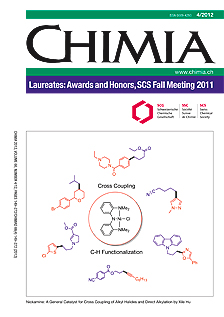Indole Alkaloids Synthesis via a Selective Cyclization of Aminocyclopropanes
DOI:
https://doi.org/10.2533/chimia.2012.233Keywords:
Activated cyclopropanes, Alkaloids, Heterocycles, Regioselectivity, Total synthesisAbstract
The continuous progress in medicinal chemistry requires more versatile synthetic strategies for the generation of large libraries of active compounds and their analogues. As a result, the research for new effective cyclization and cycloaddition reactions is an essential task in organic chemistry. In 2008 we developed the first catalytic formal homo-Nazarov reaction starting from activated cyclopropanes. Herein we report the extension of the catalytic formal homo-Nazarov cyclization to aminocyclopropanes. Highly diastereoselective cyclizations were obtained via an acyliminium intermediate generated through opening of the cyclopropane. An excellent control over the regioselectivity of either the C–C or C–N cyclization in the case of free indoles as nucleophilic partners was achieved. The utility of the developed methodology was demonstrated by the generation of the polycyclic scaffolds of Aspidosperma and Gonioma natural products starting from a common intermediate. Based on this method, a formal total synthesis of the alkaloid aspidospermidine and the total synthesis of the alkaloid goniomitine are presented. Finally, the scope and limitations of our methodology are discussed on an extended range of vinyl-cyclopropyl ketones with cyclic or acyclic carbamates, as well as ethers as donor groups on the cyclopropane.Downloads
Published
2012-04-25
How to Cite
[1]
F. De Simone, J. Waser, Chimia 2012, 66, 233, DOI: 10.2533/chimia.2012.233.
Issue
Section
Scientific Articles
License
Copyright (c) 2012 Swiss Chemical Society

This work is licensed under a Creative Commons Attribution-NonCommercial 4.0 International License.







